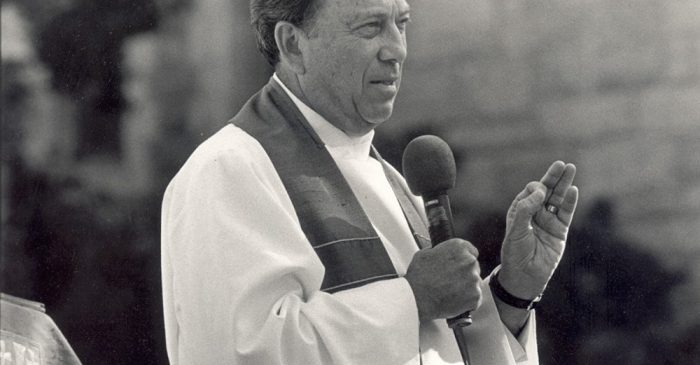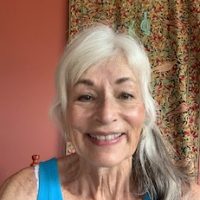Today I’m grieving the loss of a mentor. Probably the person who has influenced my life the most, in so many ways. He is George Regas, retired rector of All Saints Episcopal Church in Pasadena, where I was involved for many years.
George was a firebrand prophet, whose sermons shook his well-to-do white parish into a new consciousness. He led us through every peace and justice issue from the ’70’s onward. Arriving in 1967 at age 37, he began a long tenure that would transform the notion of church for me, and for so many others. He would lead us into uncomfortable territory, territory that would demand a new inclusivity, a new concern for the marginalized everywhere, and the courage to speak truth to power even from the pulpit and the budget.
The first time I experienced George was in a forum—a meeting of the interested parishioners between the two Sunday services. He spoke about his own divorce, an event which had many traditional Anglicans pressuring the Vestry (the church equivalent of a board of directors) to ask for his resignation. In those days, Anglicans had long ago decided that priests could marry, but divorce was another matter. I remember sitting in the basement meeting room, where study pillars partly obscured my view of him, causing me to move my head from left to right, so as not to miss a moment of his passion. “I will not resign,” he thundered, citing all the reasonable reasons. I left a little shocked at his nerve, and wanted to come back the next week to see what he would have to say next.
That must have been about 1970 or ’71, since I remember deciding when Laura was three that I ought to introduce her to a spiritual path. So, we delivered her to Sunday School, and baby Erin to the nursery, while we attended grownup church. Right away I began to get to know other mothers, some Sunday school teachers, and other parishioners who were fans of George.
From a priest’s right to divorce, we went on to face the issue of world hunger, the AIDS crisis, homelessness, the Viet Nam war, the nuclear arms race, women’s ordination, abortion, racism and gay rights. In between themes there were countless other issues that demanded our awareness. After being elected to the Vestry, I served on a social justice committee that George headed. He wanted us to recommend the Vestry take a stand against Nestle because of their habit of selling infant formula to impoverished women in Africa. I objected, feeling it wasn’t the role of a church to go about confronting corporations. But our research revealed that Nestle was sending sales people to Africa dressed as nurses. Once the women began using formula samples that were given free, their milk would dry up and they were now dependent on formula they couldn’t possibly afford. I changed my mind. The Vestry agreed to take a stand, and the parish almost all joined a boycott of Nestle products.
George brought Cesar Chavez to the the guest pulpit. Desmond Tutu became a friend and visited the church. And, we had the chance to volunteer to get close and personal with our chosen issues. I was a photographer by then, and volunteered a lot of photography to the church. I did a series on AIDS patients that nearly broke my heart, and opened my eyes. I felt thrilled to photograph the first ordination of a woman priest. I participated in an exchange with students from Russia, an experiment in communication across geopolitical and linguistic barriers. It was thrilling. Disturbing.
During the Viet Nam war, George preached some unforgettable sermons, like one he titled “The Cut Flower Generation.” I called it the Clicking of the Heels sermon, since during it there were a number of well-dressed, offended women who noisily stood up and walked out, every step punctuated by the old tile floors. These kinds of objections, including the withdrawal of some heavy pledges, continued through the years as George led us to take stands on issues that continued after my move to AZ in 1989 until his retirement in 1995. After I left, he took on the war in Iraq, LBGTQ rights and marriage equality.
I learned so much from him. About the suffering of the world. About who I consider the real Jesus to be. About the beauty of interfaith collaborations that reveal the common mystical core of all religions. About the intersection of the intellect and the heart.And even about how a church is run, how money is raised, how people are hired and fired and how institutions can be rebuilt, protected. And about being involved in birth and death and joy and sorrow on a more intimate level.
Not only did he open my eyes, George touched my heart with his pastoral skills. He counseled Bob and me through what would become our painful divorce. He married Jon and me, after a series of powerful, moving counseling sessions preceding our wedding. He married Erin and Stephen. My daughters were moved by him in deep ways. Who knows how he may have contributed to and reinforced Laura’s passion for social justice? And Erin has been touched by ongoing contact with him. At the last Christmas party she attended when he was able to be there, he said to her, “You won’t forget me, will you?”
She won’t. And we won’t either.


 Share on bsky
Share on bsky





Read 4 comments and reply